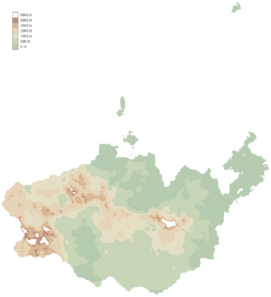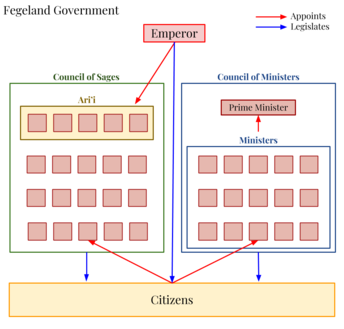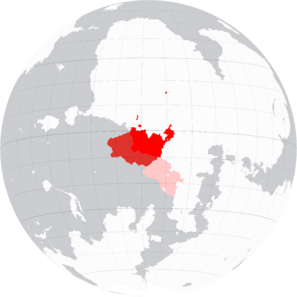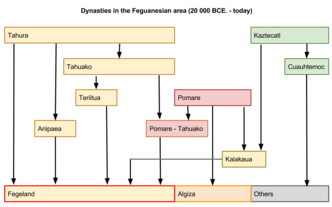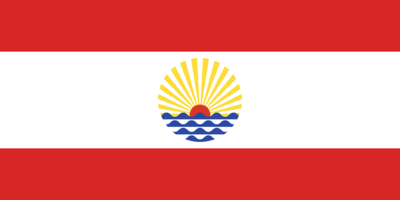Fegeland
|
The Very Democratic Constitutional Empire of Fegeland
Te Fenua Fekelani
|
|||||
|---|---|---|---|---|---|
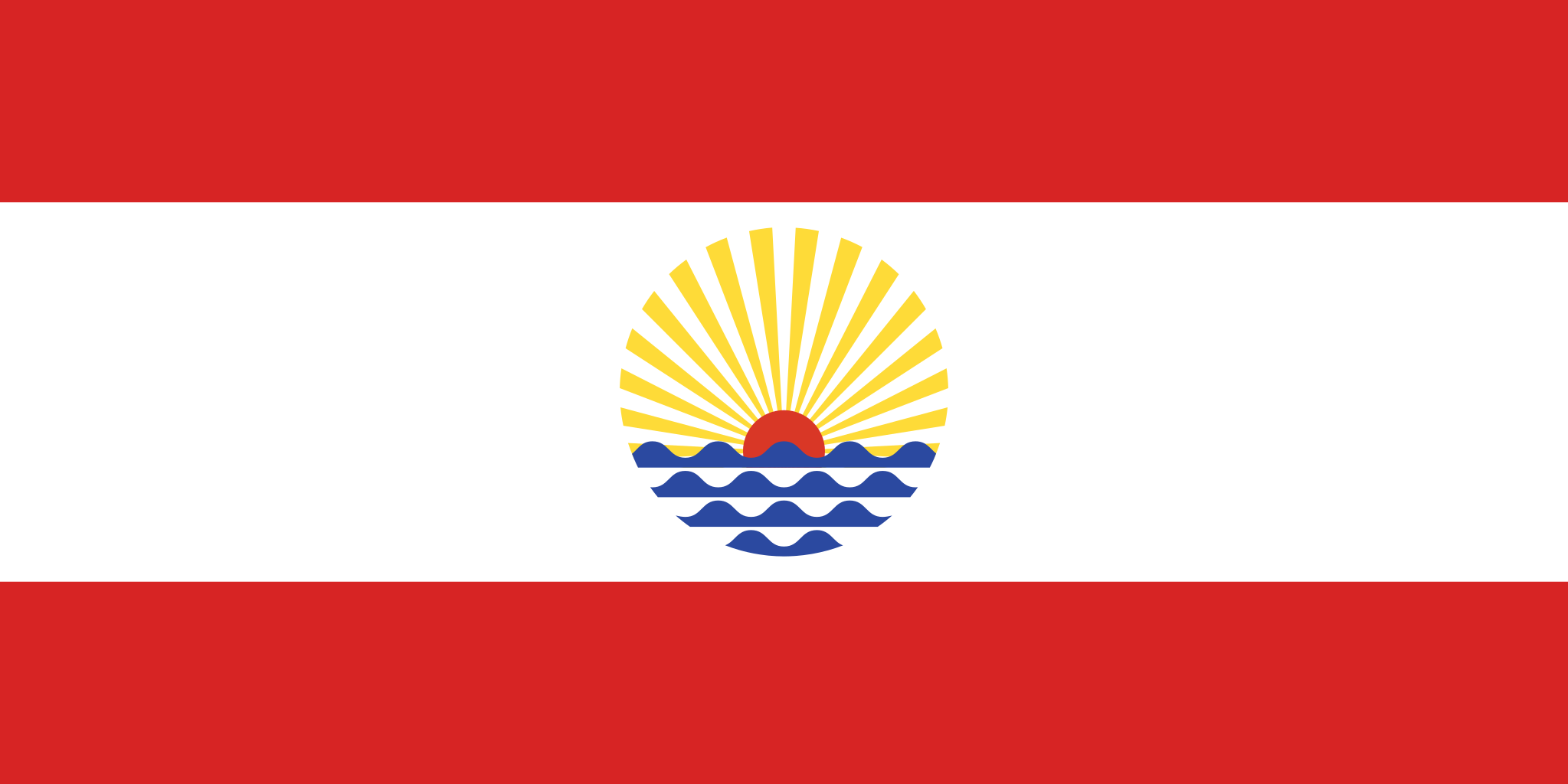 |
|||||
| The flag of the Empire of Fegeland. The red rising sun, historical symbol of the feguanesian culture, is at the center of the flag. | |||||
| Motto | "'Ia ora 'o Fekelani Rahi" | ||||
| Common Name | Fegeland | ||||
| Anthem | Te Ari'i Pehe | ||||
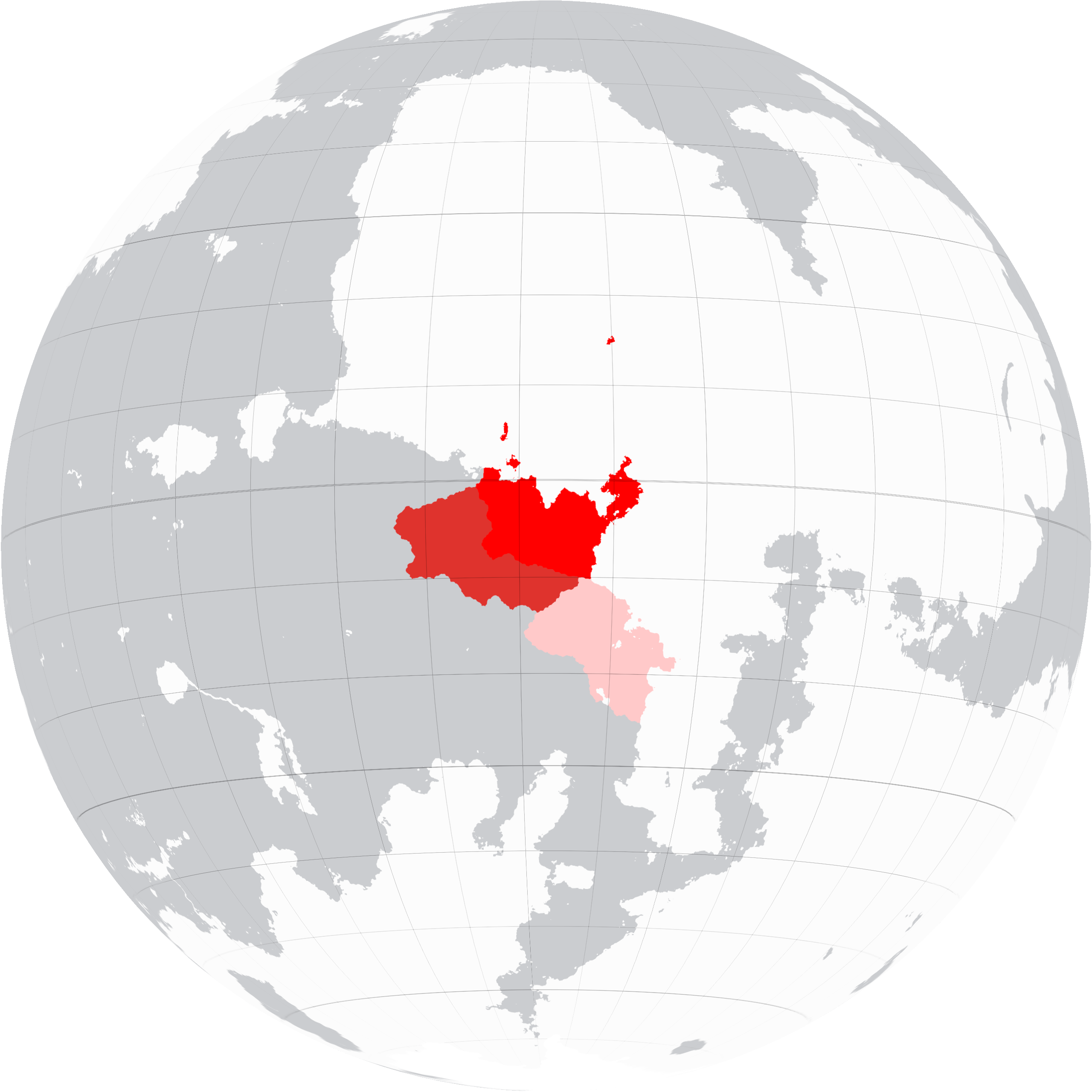 |
|||||
| A map of the Empire of Fegeland, showing the 6 main districts (5 land districts + 1 ultramarine district) and the main cities of the Empire. | |||||
| Demonym | Feguanesian ( short. : Feguan ) | ||||
| Official languages | Feguan (Te Reo Fekelani), Kaztecatluan, Shojuntan | ||||
| Currency | Feguan Franc | ||||
| Politics | |||||
| Capital | Fegua | ||||
| Government | Imperial Republic | ||||
| Foundation | 2048 - 2177 | ||||
| Emperor | Namresh Terei Tahura Kerman | ||||
| Preceded by | South Feguanesian Alliance | ||||
| Demography | |||||
| Ethnicities | Feguan Algizan Kaztec Laveskan |
||||
| Population | 7,591,842 | ||||
| Area | 48,625 km² km² | ||||
The Empire of Fegeland, formally the Very Democratic Constitutional Republican Empire of Fegeland, is a nation located on the south of the Central Sea, at the heart of Feguanesia. Fegeland is a bi-cameral Empire led by a Great Emperor, lately His Majesty Vaitao (Namrai) Namresh Jr. Terei Tahura Kerman, the 1st (2130 - 2134).
Etymology
###
Geography
Climate
###
Biodiversity
###
Urban Areas
Politics
Government
Fegeland's government is mostly an Imperial Republic with two main Chambers: the Council of Ministers and the Council of Sages.
The Emperor
The Emperor of Fegeland is the highest authority in the Empire. He appoints the Sages and the Governors. He designates his successor (most often his direct heir), who succeeds him in case of death or resignation. There is no way to dismiss the Emperor, exept by war. The Emperor can legislate by decree.
The Council of Sages
The Council of Sages is the oldest institution of the Empire. It's story starts during the end of the Feguanesian monarchic tribes era, when the south tribes united in an alliance. It is composed of a small number of Sages appointed by the Emperor. The Sages are usually descendants of kings of ancient tribes, and are appointed for life. They can be dismissed by a vote or by the Emperor. There is one Great Sage per District, so there is 6 Great Sages in total. The Great Sages are not dismissible by vote, have a veto right and lead the deliberations of the Council. The Great Sages are descendants of the Ari'i , the old Feguanesian kings. Most of them belongs to one of the ari'i dynasties. The Council of Sages is responsible for debating the legislative proposals of the Council of Ministers at General Assemblies
The Council of Ministers
The Council of Ministers is elected by proportional universal ballot. There is one Minister per Ministry (one for Space, one for Economy, and so on) and a Prime Minister, elected by the Ministers. Unlike in other Republics, there is also one Minister per District. They can vote laws that will need the Council of Sage's approval before being applied.
Temporary Government (2071 - 2073)
After the Revolution, the former government escaped to Huturoa, and formed the Temporary Imperial Government for the Empire Recovery (TIGER). Led by Namresh Tahura Kerman (DSOF, FMOH, FSO), who was given the full powers, the TIGER had the same working principles as the legacy government. After Namresh disappeared in a surfing accident at Teahupo'o, the role of Temporary Emperor was given to Hititoa Fa'atuarai, his former Prime Minister. Namresh later came back after having taken part in Wipe Out.
Foreign Relations
###
Demographics
###
Languages
Education
###
Religion
###
Age
###
Military
###
Air Force
- Main Article: Feguan Air Force
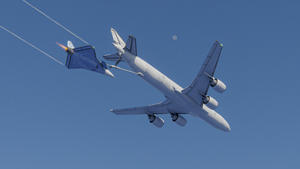
###
###
Army
###
Economy
###
Taxation
###
Transport

###
Energy and Infrastructure
###
Trade
###
Science
###
History
- Main Article: History of Fegeland
Prekerbinian and Feguanesian period
- Main Article: Feguan Mythology
Geological history of mainland Feguanesia dates from the formation of the Doren continent, with little changes since the formation of the Central Sea. Neither of Fegeland's coasts are tectonically active. The only mountainous massif in Feguanesia, the Kaztecatl Mountains, are the northernmost remains of the now gone Dorvician Chain. After the formation of Doren, a second period of tectonic activity (~450MY) raised younger peaks on top of the older massif. Although not among the highest mountainous chains in Doren, the Kaztecatl have stood as a natural barrier for millions of years, separating coastal Feguanesia from the plains and plateaus of central Doren.
Early traces of Kerbal activity were found along the northern coasts of Fegeland, dating from around 20 000 BC. Prehistoric remains, choppers, traces of settlements and cave paintings have been discovered in several notable sites in modern Fegeland and Algiza, depicting an early colonization from the littoral hilly lands of northern Feguanesia, made fertile by the tropical climate and rainfalls on the Kaztecatl Mountains. The harsher continental climate of southern Feguanesia prevented the settlement of sedentary peoples until much later.
Settlement and birth of Fegeland
Current Empire of Fegeland
Nowadays, the Feguanesian culture and traditions still remains alive on the islands and coasts of the south of Central Sea, and have a strong place in Fegeland's popular culture.
Notable Events
Arc I - A Rising Sunshine
- Foundation of the first ari'i vahi (Feguanesian kingdom) (~ 8000 BC.)
- Advent of the Tahura Dynasty (~ 8000 BC. - today)
- The Feguan - Kaztecatl War (~250 to ~260)
- Foundation of the Feguanesian Alliance (1425)
- Kaztecatluan revolution attempts (1789, 1799)
- Foundation of the Empire of Fegeland (2048)
- Creation of the Confederation of Feguanesian States (CFS) (2050)
- Huturoa aerospace accident (2052)
- Military intervention against Sanctum's blockade (2055)
- First successful powered rocket recovery (2055)
- Reorganization of the space sector and reelection of the Government (2060)
- Launch of the FSS Vaiatea space station (2058 - today)
- First probe landing on Eeloo (2064)
- Ta'atearoa Program (2064 - today)
- Collapse of Fegeland into the Revolution (2071 - 2073)
- Restoration of the Empire thanks to Wipe Out (2074)
- [This list isn't up to date. Many major events are still missing. Check the Reddit.]
Notable Feguan personalities
- Pr. Faurai Rainui (1998 - 2064), leader of FAITO Aerospace, PhD in Astronautics and Astrophysics. Shot himself.
About The Flag
###
